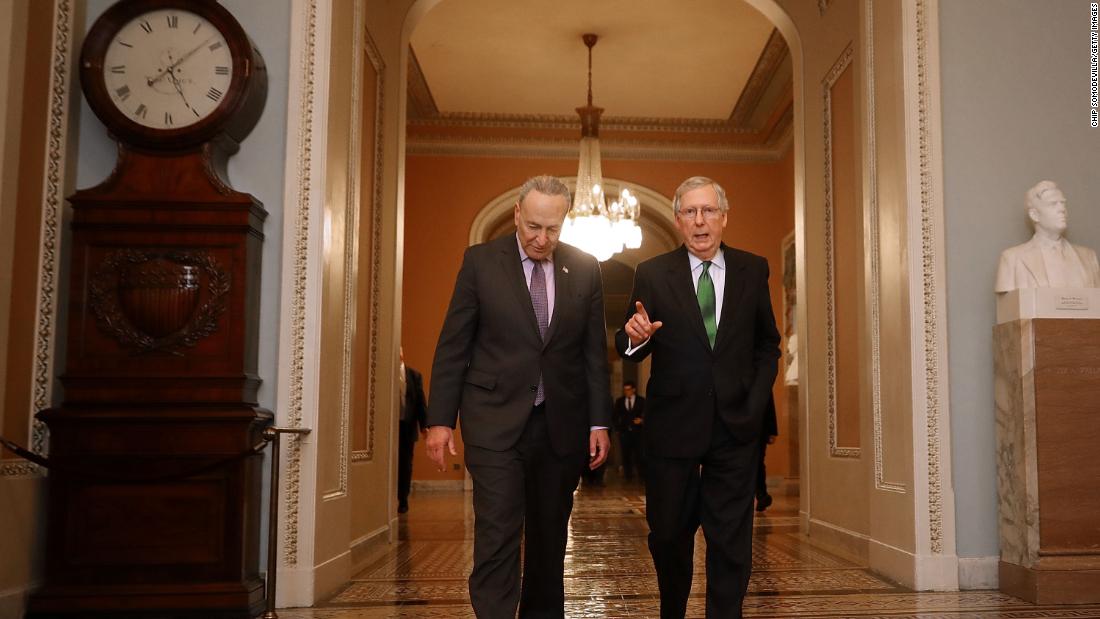
The votes are slated to start at 2:30 p.m. ET. First up will be a vote on a Republican-backed proposal that would allocate $5.7 billion for President Donald Trump's long-promised border wall. The second vote will take up a Democratic-backed proposal that would temporarily reopen shuttered government agencies without providing any money for a wall.
Neither measure is expected to receive the 60 votes needed to advance in the Senate.
And there is still no sign yet on Capitol Hill that the shutdown is nearing an end.
In the latest sign of partisan acrimony over the shutdown, House Speaker Nancy Pelosi and the President went back-and-forth on Wednesday over whether the President will deliver the State of the Union address at the Capitol despite the ongoing lapse in government funding.
Trump sent a letter to Pelosi saying he still planned on giving the speech, despite an earlier letter from the speaker suggesting that he postpone the address until the shutdown ends or deliver it in writing. Pelosi responded to the President by saying she would not allow him to deliver the address in the House chamber while the government remains shut down.
Pelosi called on Senate Republicans to vote for the Democratic-backed measure up for a vote today in her weekly press conference on Thursday.
"There's no excuse for Senate Republicans not to pass this legislation," she said.
Some senators have announced how they plan to vote ahead of time, including some lawmakers who are willing to cross the aisle to vote for the other party's measure -- though for now it is still unlikely there will be a critical mass of crossovers to advance either.
Sen. Joe Manchin of West Virginia, a red state Democrat, told reporters that he is voting yes on both bills this afternoon because he wants the government to move forward, calling the shutdown "ridiculous."
He said that it is man-made and that it is turning into a "catastrophe" and an "emergency."
Maine Republican Sen. Susan Collins will also vote to advance both measures, a spokesperson confirmed to CNN.
House Democrats have repeatedly passed legislation to reopen the government since taking over the majority in the lower chamber and continue to do so this week. But none of those proposals have included the money requested by the President to fund the wall, triggering White House veto threats and making the bills dead on arrival in the Senate.
Senate Majority Leader Mitch McConnell and Senate Minority Leader Chuck Schumer announced earlier in the week that they had reached an agreement to hold Thursday's votes, which will be the first major movement in the Senate related to the shutdown since it started just days before Christmas.
The Republican measure is in line with what the President outlined last weekend when he asked for $5.7 billion in funding for a border wall in exchange for temporary protections for some immigrants.
Democrats swiftly rejected that offer and have steadfastly opposed allocating the funds requested by the President for his long-promised wall at the US-Mexico border.
The Democratic measure to reopen government that will receive a vote Thursday would temporarily reopen government into early February.
Congressional Democrats have insisted that the government should reopen first before lawmakers proceed to a debate on border security measures.
But so far, the President has not signaled that he is willing to move away from his demand for more than $5 billion for the wall that he made his signature issue while campaigning for the White House.
The math in the Senate makes it clear that both of the measures up for a vote on Thursday have little chance to pass, barring some kind of unexpected development.
Seven Democrats would have to crossover for the GOP bill to pass -- Republicans hold 53 Senate seats -- and there has been little indication that's possible. And 13 Republicans would have to crossover for the Democratic bill to pass, which is also unlikely unless Trump were to reverse course and support the bill.
The decision to allow votes on measures that are not certain to receive the bipartisan support needed to pass Congress and be signed into law by the President marks a shift for McConnell, who had previously said repeatedly after the shutdown started that he would not take up legislation related to the funding impasse unless it was clear it would be able to pass Congress and be signed into law by the President.
This story has been updated with additional developments Thursday.
No comments:
Post a Comment